#ftc.
Explore tagged Tumblr posts
Text
"The target of the latest consumer protection rule unveiled by the Biden-Harris administration's Federal Trade Commission on Wednesday is, as one journalist said, "one of those things that sounds minor but is at the heart of many of the frustrations of American life": The hoops people in the U.S. are required to jump through to cancel subscriptions or services they no longer want or need.
The FTC announced that its "click-to-cancel" rule, part of the agency's review of the 1973 Negative Option Rule, was finalized and will go into effect 180 days after it is published in the Federal Register.
Under the rule, sellers will be required to "make it as easy for consumers to cancel their enrollment as it was to sign up," said the FTC."
3K notes
·
View notes
Text
The one weird monopoly trick that gave us Walmart and Amazon and killed Main Street
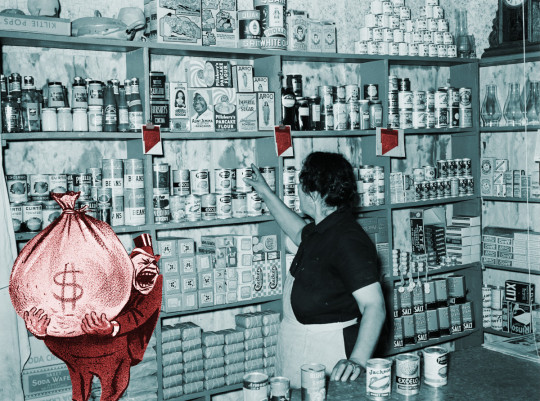
I'm coming to BURNING MAN! On TUESDAY (Aug 27) at 1PM, I'm giving a talk called "DISENSHITTIFY OR DIE!" at PALENQUE NORTE (7&E). On WEDNESDAY (Aug 28) at NOON, I'm doing a "Talking Caterpillar" Q&A at LIMINAL LABS (830&C).

Walmart didn't just happen. The rise of Walmart – and Amazon, its online successor – was the result of a specific policy choice, the decision by the Reagan administration not to enforce a key antitrust law. Walmart may have been founded by Sam Walton, but its success (and the demise of the American Main Street) are down to Reaganomics.
The law that Reagan neutered? The Robinson-Patman Act, a very boring-sounding law that makes it illegal for powerful companies (like Walmart) to demand preferential pricing from their suppliers (farmers, packaged goods makers, meat producers, etc). The idea here is straightforward. A company like Walmart is a powerful buyer (a "monopsonist" – compare with "monopolist," a powerful seller). That means that they can demand deep discounts from suppliers. Smaller stores – the mom and pop store on your Main Street – don't have the clout to demand those discounts. Worse, because those buyers are weak, the sellers – packaged goods companies, agribusiness cartels, Big Meat – can actually charge them more to make up for the losses they're taking in selling below cost to Walmart.
Reagan ordered his antitrust cops to stop enforcing Robinson-Patman, which was a huge giveaway to big business. Of course, that's not how Reagan framed it: He called Robinson-Patman a declaration of "war on low prices," because it prevented big companies from using their buying power to squeeze huge discounts. Reagan's court sorcerers/economists asserted that if Walmart could get goods at lower prices, they would sell goods at lower prices.
Which was true…up to a point. Because preferential discounting (offering better discounts to bigger customers) creates a structural advantage over smaller businesses, it meant that big box stores would eventually eliminate virtually all of their smaller competitors. That's exactly what happened: downtowns withered, suburban big boxes grew. Spending that would have formerly stayed in the community was whisked away to corporate headquarters. These corporate HQs were inevitably located in "onshore-offshore" tax haven states, meaning they were barely taxed at the state level. That left plenty of money in these big companies' coffers to spend on funny accountants who'd help them avoid federal taxes, too. That's another structural advantage the big box stores had over the mom-and-pops: not only did they get their inventory at below-cost discounts, they didn't have to pay tax on the profits, either.
MBA programs actually teach this as a strategy to pursue: they usually refer to Amazon's "flywheel" where lower prices bring in more customers which allows them to demand even lower prices:
https://www.youtube.com/watch?v=BaSwWYemLek
You might have heard about rural and inner-city "food deserts," where all the independent grocery stores have shuttered, leaving behind nothing but dollar stores? These are the direct product of the decision not to enforce Robinson-Patman. Dollar stores target working class neighborhoods with functional, beloved local grocers. They open multiple dollar stores nearby (nearly all the dollar stores you see are owned by one of two conglomerates, no matter what the sign over the door says). They price goods below cost and pay for high levels of staffing, draining business off the community grocery store until it collapses. Then, all the dollar stores except one close and the remaining store fires most of its staff (working at a dollar store is incredibly dangerous, thanks to low staffing levels that make them easy targets for armed robbers). Then, they jack up prices, selling goods in "cheater" sizes that are smaller than the normal retail packaging, and which are only made available to large dollar store conglomerates:
https://pluralistic.net/2023/03/27/walmarts-jackals/#cheater-sizes
Writing in The American Prospect, Max M Miller and Bryce Tuttle1 – a current and a former staffer for FTC Commissioner Alvaro Bedoya – write about the long shadow cast by Reagan's decision to put Robinson-Patman in mothballs:
https://prospect.org/economy/2024-08-13-stopping-excessive-market-power-monopoly/
They tell the story of Robinson-Patman's origins in 1936, when A&P was using preferential discounts to destroy the independent grocery sector and endanger the American food system. A&P didn't just demand preferential discounts from its suppliers; it also charged them a fortune to be displayed on its shelves, an early version of Amazon's $38b/year payola system:
https://pluralistic.net/2022/11/28/enshittification/#relentless-payola
They point out that Robinson-Patman didn't really need to be enacted; America already had an antitrust law that banned this conduct: section 2 of the the Clayton Act, which was passed in 1914. But for decades, the US courts refused to interpret the Clayton Act according to its plain meaning, with judges tying themselves in knots to insist that the law couldn't possibly mean what it said. Robinson-Patman was one of a series of antitrust laws that Congress passed in a bid to explain in words so small even federal judges could understand them that the purpose of American antitrust law was to keep corporations weak:
https://pluralistic.net/2023/04/14/aiming-at-dollars/#not-men
Both the Clayton Act and Robinson-Patman reject the argument that it's OK to let monopolies form and come to dominate critical sectors of the American economy based on the theoretical possibility that this will lead to lower prices. They reject this idea first as a legal matter. We don't let giant corporations victimize small businesses and their suppliers just because that might help someone else.
Beyond this, there's the realpolitik of monopoly. Yes, companies could pass lower costs on to customers, but will they? Look at Amazon: the company takes $0.45-$0.51 out of every dollar that its sellers earn, and requires them to offer their lowest price on Amazon. No one has a 45-51% margin, so every seller jacks up their prices on Amazon, but you don't notice it, because Amazon forces them to jack up prices everywhere else:
https://pluralistic.net/2024/03/01/managerial-discretion/#junk-fees
The Robinson-Patman Act did important work, and its absence led to many of the horribles we're living through today. This week on his Peoples & Things podcast, Lee Vinsel talked with Benjamin Waterhouse about his new book, One Day I’ll Work for Myself: The Dream and Delusion That Conquered America:
https://athenaeum.vt.domains/peoplesandthings/2024/08/12/78-benjamin-c-waterhouse-on-one-day-ill-work-for-myself-the-dream-and-delusion-that-conquered-america/
Towards the end of the discussion, Vinsel and Waterhouse turn to Robinson-Patman, its author, Wright Patman, and the politics of small business in America. They point out – correctly – that Wright Patman was something of a creep, a "Dixiecrat" (southern Democrat) who was either an ideological segregationist or someone who didn't mind supporting segregation irrespective of his beliefs.
That's a valid critique of Wright Patman, but it's got little bearing on the substance and history of the law that bears his name, the Robinson-Patman Act. Vinsel and Waterhouse get into that as well, and while they made some good points that I wholeheartedly agreed with, I fiercely disagree with the conclusion they drew from these points.
Vinsel and Waterhouse point out (again, correctly) that small businesses have a long history of supporting reactionary causes and attacking workers' rights – associations of small businesses, small women-owned business, and small minority-owned businesses were all in on opposition to minimum wages and other key labor causes.
But while this is all true, that doesn't make Robinson-Patman a reactionary law, or bad for workers. The point of protecting small businesses from the predatory practices of large firms is to maintain an American economy where business can't trump workers or government. Large companies are literally ungovernable: they have gigantic war-chests they can spend lobbying governments and corrupting the political process, and concentrated sectors find it comparatively easy to come together to decide on a single lobbying position and then make it reality.
As Vinsel and Waterhouse discuss, US big business has traditionally hated small business. They recount a notorious and telling anaecdote about the editor of the Chamber of Commerce magazine asking his boss if he could include coverage of small businesses, given the many small business owners who belonged to the Chamber, only to be told, "Over my dead body." Why did – why does – big business hate small business so much? Because small businesses wreck the game. If they are included in hearings, notices of inquiry, or just given a vote on what the Chamber of Commerce will lobby for with their membership dollars, they will ask for things that break with the big business lobbying consensus.
That's why we should like small business. Not because small business owners are incapable of being petty tyrants, but because whatever else, they will be petty. They won't be able to hire million-dollar-a-month union-busting law-firms, they won't be able to bribe Congress to pass favorable laws, they can't capture their regulators with juicy offers of sweet jobs after their government service ends.
Vinsel and Waterhouse point out that many large firms emerged during the era in which Robinson-Patman was in force, but that misunderstands the purpose of Robinson-Patman: it wasn't designed to prevent any large businesses from emerging. There are some capital-intensive sectors (say, chip fabrication) where the minimum size for doing anything is pretty damned big.
As Miller and Tuttle write:
The goal of RPA was not to create a permanent Jeffersonian agrarian republic of exclusively small businesses. It was to preserve a diverse economy of big and small businesses. Congress recognized that the needs of communities and people—whether in their role as consumers, business owners, or workers—are varied and diverse. A handful of large chains would never be able to meet all those needs in every community, especially if they are granted pricing power.
The fight against monopoly is only secondarily a fight between small businesses and giant ones. It's foundationally a fight about whether corporations should have so much power that they are too big to fail, too big to jail, and too big to care.

Community voting for SXSW is live! If you wanna hear RIDA QADRI and me talk about how GIG WORKERS can DISENSHITTIFY their jobs with INTEROPERABILITY, VOTE FOR THIS ONE!

If you'd like an essay-formatted version of this post to read or share, here's a link to it on pluralistic.net, my surveillance-free, ad-free, tracker-free blog:
https://pluralistic.net/2024/08/14/the-price-is-wright/#enforcement-priorities
#pluralistic#Robinson-Patman Act#ftc#alvaro bedoya#monopoly#monopsony#main street#too big to jail#too big to care#impunity#regulatory capture#prices#the american prospect#Max M Miller#Bryce Tuttle#a and p#wright patman
2K notes
·
View notes
Text
Federal regulators on Tuesday [April 23, 2024] enacted a nationwide ban on new noncompete agreements, which keep millions of Americans — from minimum-wage earners to CEOs — from switching jobs within their industries.
The Federal Trade Commission on Tuesday afternoon voted 3-to-2 to approve the new rule, which will ban noncompetes for all workers when the regulations take effect in 120 days [So, the ban starts in early September, 2024!]. For senior executives, existing noncompetes can remain in force. For all other employees, existing noncompetes are not enforceable.
[That's right: if you're currently under a noncompete agreement, it's completely invalid as of September 2024! You're free!!]
The antitrust and consumer protection agency heard from thousands of people who said they had been harmed by noncompetes, illustrating how the agreements are "robbing people of their economic liberty," FTC Chair Lina Khan said.
The FTC commissioners voted along party lines, with its two Republicans arguing the agency lacked the jurisdiction to enact the rule and that such moves should be made in Congress...
Why it matters
The new rule could impact tens of millions of workers, said Heidi Shierholz, a labor economist and president of the Economic Policy Institute, a left-leaning think tank.
"For nonunion workers, the only leverage they have is their ability to quit their job," Shierholz told CBS MoneyWatch. "Noncompetes don't just stop you from taking a job — they stop you from starting your own business."
Since proposing the new rule, the FTC has received more than 26,000 public comments on the regulations. The final rule adopted "would generally prevent most employers from using noncompete clauses," the FTC said in a statement.
The agency's action comes more than two years after President Biden directed the agency to "curtail the unfair use" of noncompetes, under which employees effectively sign away future work opportunities in their industry as a condition of keeping their current job. The president's executive order urged the FTC to target such labor restrictions and others that improperly constrain employees from seeking work.
"The freedom to change jobs is core to economic liberty and to a competitive, thriving economy," Khan said in a statement making the case for axing noncompetes. "Noncompetes block workers from freely switching jobs, depriving them of higher wages and better working conditions, and depriving businesses of a talent pool that they need to build and expand."
Real-life consequences
In laying out its rationale for banishing noncompetes from the labor landscape, the FTC offered real-life examples of how the agreements can hurt workers.
In one case, a single father earned about $11 an hour as a security guard for a Florida firm, but resigned a few weeks after taking the job when his child care fell through. Months later, he took a job as a security guard at a bank, making nearly $15 an hour. But the bank terminated his employment after receiving a letter from the man's prior employer stating he had signed a two-year noncompete.
In another example, a factory manager at a textile company saw his paycheck dry up after the 2008 financial crisis. A rival textile company offered him a better job and a big raise, but his noncompete blocked him from taking it, according to the FTC. A subsequent legal battle took three years, wiping out his savings.
-via CBS Moneywatch, April 24, 2024
--
Note:
A lot of people think that noncompete agreements are only a white-collar issue, but they absolutely affect blue-collar workers too, as you can see from the security guard anecdote.
In fact, one in six food and service workers are bound by noncompete agreements. That's right - one in six food workers can't leave Burger King to work for Wendy's [hypothetical example], in the name of "trade secrets." (x, x, x)
Noncompete agreements also restrict workers in industries from tech and video games to neighborhood yoga studios. "The White House estimates that tens of millions of workers are subject to noncompete agreements, even in states like California where they're banned." (x, x, x)
The FTC estimates that the ban will lead to "the creation of 8,500 new businesses annually, an average annual pay increase of $524 for workers, lower health care costs, and as many as 29,000 more patents each year for the next decade." (x)
Clearer explanation of noncompete agreements below the cut.
Noncompete agreements can restrict workers from leaving for a better job or starting their own business.
Noncompetes often effectively coerce workers into staying in jobs they want to leave, and even force them to leave a profession or relocate.
Noncompetes can prevent workers from accepting higher-paying jobs, and even curtail the pay of workers not subject to them directly.
Of the more than 26,000 comments received by the FTC, more than 25,000 supported banning noncompetes.
#seriously cannot emphasize enough that this is going to be a huge deal for so so many people#it could seriously drag up wages in food and service industries in particular#especially in the long run#and also massively reshape tech and video game industries#do you have any idea how many game devs are legally not allowed to start their own studios? probably most of them#and that's about to change for the better!!#ftc#noncompete#united states#us politics#business#business news#biden administration#voting matters#democrats#federal trade commission#video game industry#game devs#fast food#fast food workers#labor#labor rights#workers rights#blue collar#service workers#good news#hope
3K notes
·
View notes
Text
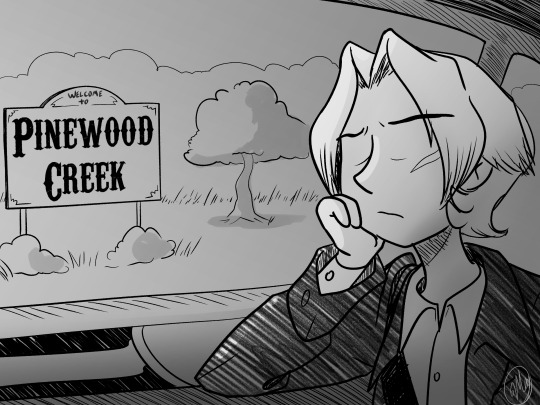
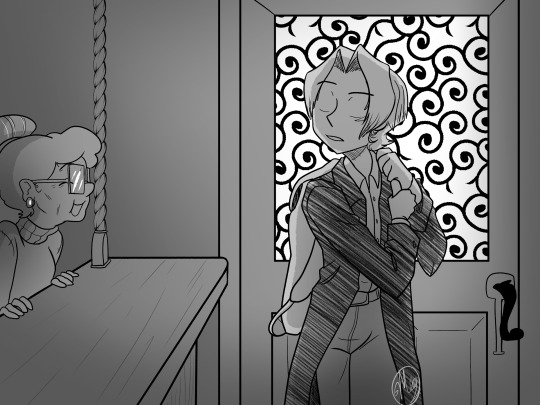
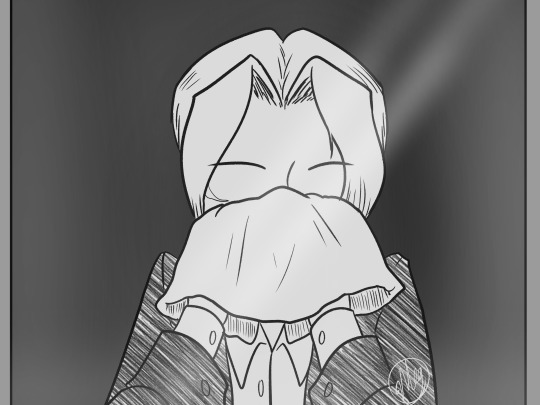

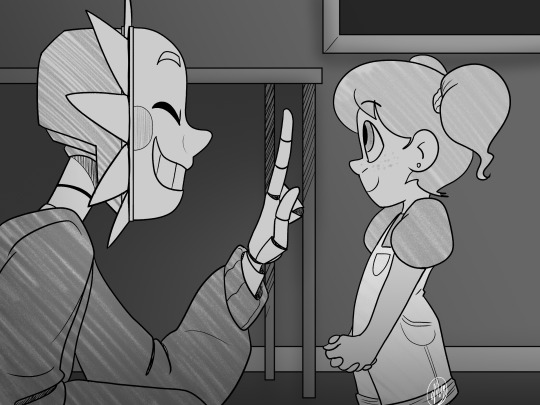
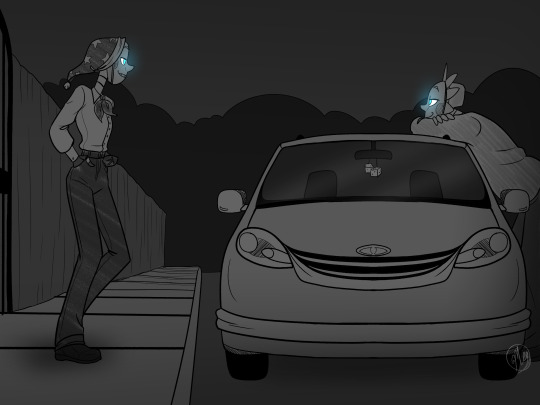
Just realized I don't think I ever posted the illustrations for this story here!
Here are the illustrations for chapter 1!
#dca!serial killer au#serial killer duo#sk boys#sk sun#sk moon#serial killer sun#serial killer moon#illustrations#for the children#ao3#fnaf sun#fnaf moon#fnaf daycare au#fnaf dca au#fnaf daycare attendant#dca au#ftc chapter 1#sun the librarian#moon the security guard#detective y/n#mrs. branson
773 notes
·
View notes
Text
To talk about monopoly & antitrust, I want to start off with your first day in Econ 101, when you learn "how prices work". The toy model that nearly everyone learns as one of the first things ever is that classic supply-and-demand graph of price and quantity; you know it, I don't need to show it. And in relation to how firms set price in a market, the explanation you get is something like:
"In a world with perfect information, zero transaction costs, rational agents, and no barriers to entry, new firms and/or increased output will enter the market until marginal price equals marginal cost"
This (seemingly) portrays a model where new companies "entering the market" is how prices go down. Like say there are Firms A, B, and C, engaging in oligopolistic pricing for a normal good; what happens is some new Firm X (with the same production costs) emerges with the sole business strategy of "offer prices lower than them because they are skimming" and it drives everyone's prices down in a race to the bottom. That, in a sense, competition between identical firms drives the price equilibrium.
That isn't very true, not in practice and not even theoretically; the 101 stuff just sort of biases you to see it that way. Firm X above is being rational in one way but silly in others; why would it enter a market where its competitors are making healthy profits just to fuck that up, knowing it has no advantage they can't immediately replicate in response? And pay all the fixed costs other firms have already paid to make that 0.1% profit? In real life firms almost never do this, they compete over (actual or perceived) advantage or market segmentation. And it also means that - if all firms are truly the same in a market - cooperating on price, far from being aberrant behavior, is the natural thing to do. Why would I look at my rival firm and lower my price to "undercut" them, knowing that they 100% can just lower it too? We both lose, immediately. In practice, companies often set their prices by looking at the prices of competing firms and matching them!
Many things actually drive the price equilibrium of course, but one of the biggest - and most useful for our purposes - is the substitution effect. If companies defacto cooperate on prices all the time, why is the price not infinity? Well because if you are selling steaks and set the price to infinity, I'm not gonna buy it! I can just buy chicken, for me it's pretty much the same. And chicken is cheaper to make than steak. As a chicken firm, I totally can set my price under your steak and you can never, ever match it; that is a real advantage, one from asymmetries of production. The price of steak is driven by the need to compete with chicken much more than it is driven by the need to compete with "other steaks". And so on down a chain of a million desires and costs and needs.
So to wrap this around to antitrust, there is a common idea out there that monopolistic pricing is increasing from the past because if I look at different industries, so many of them today are consolidated into 2-3 big firms. Your grocery stores are all Giant or Safeway or w/e it is in your city, if you are buying a TV Samsung & LG are half the entire US market. How could these companies not collude on price? Of course they do, and they don't need explicit agreements that would violate extant FTC regulations to do it; they can just softly communicate and feel out cooperation. So you gotta break them up and change the rules so they can't do that.
The trap is thinking this is any different if it was 10 firms - it really isn't! Maybe marginally, sure, and if it was 2000 firms yeah okay the sheer chaos would probably create some price churn; but in the past prices were not driven down by the diversity of firms making price cooperation impossible. The long history of guilds, business associations, chambers of commerce, and so on shows that they had plenty of avenues for cooperation - and often did straight-up set prices. Meanwhile, when Wal-Mart, Target, Aldi, and others all cut prices at around the same time, they are not mainly competing with each other. If they were they would just mutually agree to not do that, without even saying anything! How stupid do you think they are? That isn't hard to do. Instead they are competing with Amazon; with boutique local stores; with restaurants; with the changing price of labor; with shifting consumer sentiment and expectations. The industry concentration doesn't matter.
Until it does of course! Because what is the substitution good for oil? They exist of course, but they ain't cheap; people will still buy gas at gigantic ranges of prices. Here, the fundamental structure of the market is monopolistic - and also a geopolitical clusterfuck, but let's not get into that. Producers openly rig prices sometimes, and antitrust actively regulates against it, and it is a hot mess of governments and companies and all that. Are people who hold patents engaging in monopoly pricing? Obviously, that is the point of patents! It is by design; but there are tons of arguments to be made around creeping exploitation of the IP system. Sometimes hundreds of firms in a dominant market niche will offer complex, bundled products where the price of each piece of obfuscated and the value is subjective, but consensus is you can't not buy the product or you will be screwed and since you can't tell what the product even is, let alone how valuable it is, you can't object when they set the price - I hear these are called "universities", but they go by other names in other sectors.
All of the above are something like "monopolies", which maybe are getting worse over time, but they are monopolies for different, product-specific reasons. I think there is a good deal of FTC work and other reforms that could be done in the US to identify areas where this kind of rent extraction is happening. But what it doesn't look like is opposing blanket industry consolidation. And in fact the correlation is honestly pretty weak. Because identical firm competition does not drive the price equilibrium.
#antitrust discourse#This is not a review of Biden's FTC policy - they are aware of this reality at least in part#This is obliquely a critique of Matt Stoller he is not aware of this
199 notes
·
View notes
Text


a tabaxi npc from our dnd campaign. they’ve been having a rough time of things.
308 notes
·
View notes
Text
to help spread the word a lil, ask a mortician just put out a new video, this one specifically about proposed FTC regulation changes for U.S. funeral homes, and theres a comment period that closes October 10th, 2023 to ya kno. comment on em. tell em to help make funerals a lil cheaper.
youtube
I would really reccomend watching the video as she explains it a lot better, but the TLDR is that the FTC is thinking of adding some rules to the regs on how funeral homes disclose a couple of things, like prices (making them list prices online, so you dont need to drive to 7 diff funeral homes to price shop the day your son died, and cause hidden prices=more expensive), and make it clearer WHEN embalming is required (that is, that its NOT required by law, but might be required by the funeral home themselves)
like i said, watch the vid for a better explaination, but both of those things contribute to funerals being Mega Fucking Expensive, so. if you feel like it, go to the FTC and tell em to implement the changes!
comment period ends october 10th, 2023!
#ask a mortician#caitlyn doughty#funerals#ftc#federal trade commission#uspol#funeral industry#buzzy#Youtube
805 notes
·
View notes
Text
*slaps some good news onto your dash*


129 notes
·
View notes
Text


#pearls#biwa pearls#jewelry#champagne rules. they aren’t really biwas unless they come from lake biwa. for the FTC anyways#but it’s become a general trade name for a baroque bar shaped pearl
82 notes
·
View notes
Text
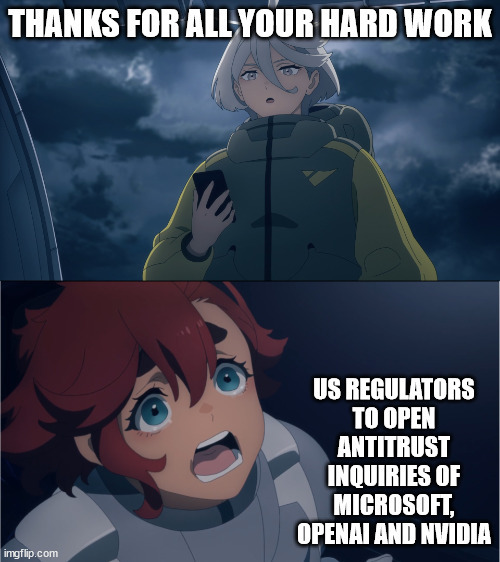
SOURCE
The U.S. Justice Department and Federal Trade Commission will conduct antitrust investigations on Microsoft, OpenAI, and Nvidia regarding their roles in the AI industry, as reported by the New York Times.
The Justice Department will focus on Nvidia, while the FTC will investigate OpenAI and Microsoft, under a deal expected to conclude soon.
The agreement between regulators was made recently and is set to be finalized in the near future, according to sources familiar with the matter.
#sulemio news#sulemio#suletta mercury#miorine rembran#g-witch#g witch#us federal trade commission#ftc#us ftc#antitrust#ftc antitrust#nvidia#microsoft#openai#antitrust lawsuit#lets fucckkkking gooooooo#lfg
192 notes
·
View notes
Text

source 1
source 2
source 3
#destiel meme#destiel meme news#united states#us news#news#amazon#fta#federal trade commission#ftc#eat it jeffrey#jeff bezos
523 notes
·
View notes
Text
Necron characters rated on how likely they would be to fall into an MLM/Pyramid Scheme
Szarekh- 9/10 Dude gets desperate whenever he has a strong enough goal. Clearly susceptible to persuasion and magical thinking. Not great at thinking through consequences.
Imotekh- 0/10 Immediately does the math and figures out the scam. Creates the 40k FTC to hunt down and destroy all MLMs out of pure spite
Trazyn- 7/10 but he inexplicably does incredibly well at it. Top seller. Gets his pink Cadillac within a week
Orikan- thinks he's immune which is why he's a 10/10 Will ride this sinking ship to the bottom of the ocean. His sanctum is soon filled with essential oils and leggings
Zahndrekh- 3/10 Seems like an easy mark so people try to recruit him constantly. He acts interested and he's so charming it takes ages after they leave for the MLMer to realize they've sold him nothing and at some point he registered them to vote?
Obyron- steely glare/10 He holds the voter registration forms
Anrakyr- 4/10 but if he does fall for one he will actually go on the record and agree to be interviewed for the take-down documentary
Phillias- undercover FTC agent/10
Szeras- 9/10 because he'll sell out and agree to become an "expert consultant" or whatever and say the shady health oils actually work
Oltyx- 2/10 Refuses to start at the bottom of any pyramid, he knows he was born to be at the top
Yenekh- 8/10 But he's just in it for the product discounts.
Zultanekh- 1/10 but pray to whatever God will listen that he never becomes a part of one because he will use his boisterous yet sensitive personality to drag the whole empire into the pyramid
Lysikor- Founded the MLM
#necrons#shitposts#been listening to The Dream podcast#got mlms on the brain#Imotekh's FTC has actual teeth they will fuck u up#unlike the actual one we have in the US#not their fault special interests are a bitch#imotekh however deals with that kinda shit very efficiently#usually via murder#at least Trazyn got his Cadillac
129 notes
·
View notes
Text
Tesla's Dieselgate
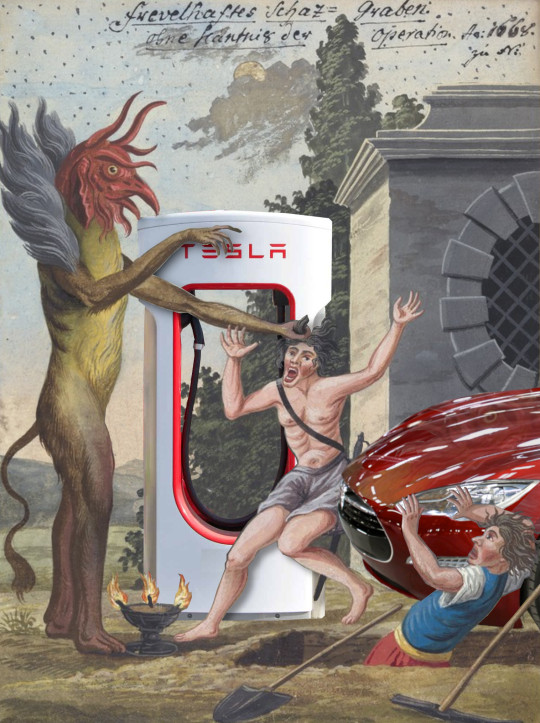
Elon Musk lies a lot. He lies about being a “utopian socialist.” He lies about being a “free speech absolutist.” He lies about which companies he founded:
https://www.businessinsider.com/tesla-cofounder-martin-eberhard-interview-history-elon-musk-ev-market-2023-2 He lies about being the “chief engineer” of those companies:
https://www.quora.com/Was-Elon-Musk-the-actual-engineer-behind-SpaceX-and-Tesla
He lies about really stupid stuff, like claiming that comsats that share the same spectrum will deliver steady broadband speeds as they add more users who each get a narrower slice of that spectrum:
https://www.eff.org/wp/case-fiber-home-today-why-fiber-superior-medium-21st-century-broadband
The fundamental laws of physics don’t care about this bullshit, but people do. The comsat lie convinced a bunch of people that pulling fiber to all our homes is literally impossible — as though the electrical and phone lines that come to our homes now were installed by an ancient, lost civilization. Pulling new cabling isn’t a mysterious art, like embalming pharaohs. We do it all the time. One of the poorest places in America installed universal fiber with a mule named “Ole Bub”:
https://www.newyorker.com/tech/annals-of-technology/the-one-traffic-light-town-with-some-of-the-fastest-internet-in-the-us
Previous tech barons had “reality distortion fields,” but Musk just blithely contradicts himself and pretends he isn’t doing so, like a budget Steve Jobs. There’s an entire site devoted to cataloging Musk’s public lies:
https://elonmusk.today/
But while Musk lacks the charm of earlier Silicon Valley grifters, he’s much better than they ever were at running a long con. For years, he’s been promising “full self driving…next year.”
https://pluralistic.net/2022/10/09/herbies-revenge/#100-billion-here-100-billion-there-pretty-soon-youre-talking-real-money
He’s hasn’t delivered, but he keeps claiming he has, making Teslas some of the deadliest cars on the road:
https://www.washingtonpost.com/technology/2023/06/10/tesla-autopilot-crashes-elon-musk/
Tesla is a giant shell-game masquerading as a car company. The important thing about Tesla isn’t its cars, it’s Tesla’s business arrangement, the Tesla-Financial Complex:
https://pluralistic.net/2021/11/24/no-puedo-pagar-no-pagara/#Rat
Once you start unpacking Tesla’s balance sheets, you start to realize how much the company depends on government subsidies and tax-breaks, combined with selling carbon credits that make huge, planet-destroying SUVs possible, under the pretense that this is somehow good for the environment:
https://pluralistic.net/2021/04/14/for-sale-green-indulgences/#killer-analogy
But even with all those financial shenanigans, Tesla’s got an absurdly high valuation, soaring at times to 1600x its profitability:
https://pluralistic.net/2021/01/15/hoover-calling/#intangibles
That valuation represents a bet on Tesla’s ability to extract ever-higher rents from its customers. Take Tesla’s batteries: you pay for the battery when you buy your car, but you don’t own that battery. You have to rent the right to use its full capacity, with Tesla reserving the right to reduce how far you go on a charge based on your willingness to pay:
https://memex.craphound.com/2017/09/10/teslas-demon-haunted-cars-in-irmas-path-get-a-temporary-battery-life-boost/
That’s just one of the many rent-a-features that Tesla drivers have to shell out for. You don’t own your car at all: when you sell it as a used vehicle, Tesla strips out these features you paid for and makes the next driver pay again, reducing the value of your used car and transfering it to Tesla’s shareholders:
https://www.theverge.com/2020/2/6/21127243/tesla-model-s-autopilot-disabled-remotely-used-car-update
To maintain this rent-extraction racket, Tesla uses DRM that makes it a felony to alter your own car’s software without Tesla’s permission. This is the root of all autoenshittification:
https://pluralistic.net/2023/07/24/rent-to-pwn/#kitt-is-a-demon
This is technofeudalism. Whereas capitalists seek profits (income from selling things), feudalists seek rents (income from owning the things other people use). If Telsa were a capitalist enterprise, then entrepreneurs could enter the market and sell mods that let you unlock the functionality in your own car:
https://pluralistic.net/2020/06/11/1-in-3/#boost-50
But because Tesla is a feudal enterprise, capitalists must first secure permission from the fief, Elon Musk, who decides which companies are allowed to compete with him, and how.
Once a company owns the right to decide which software you can run, there’s no limit to the ways it can extract rent from you. Blocking you from changing your device’s software lets a company run overt scams on you. For example, they can block you from getting your car independently repaired with third-party parts.
But they can also screw you in sneaky ways. Once a device has DRM on it, Section 1201 of the DMCA makes it a felony to bypass that DRM, even for legitimate purposes. That means that your DRM-locked device can spy on you, and because no one is allowed to explore how that surveillance works, the manufacturer can be incredibly sloppy with all the personal info they gather:
https://www.cnbc.com/2019/03/29/tesla-model-3-keeps-data-like-crash-videos-location-phone-contacts.html
All kinds of hidden anti-features can lurk in your DRM-locked car, protected from discovery, analysis and criticism by the illegality of bypassing the DRM. For example, Teslas have a hidden feature that lets them lock out their owners and summon a repo man to drive them away if you have a dispute about a late payment:
https://tiremeetsroad.com/2021/03/18/tesla-allegedly-remotely-unlocks-model-3-owners-car-uses-smart-summon-to-help-repo-agent/
DRM is a gun on the mantlepiece in Act I, and by Act III, it goes off, revealing some kind of ugly and often dangerous scam. Remember Dieselgate? Volkswagen created a line of demon-haunted cars: if they thought they were being scrutinized (by regulators measuring their emissions), they switched into a mode that traded performance for low emissions. But when they believed themselves to be unobserved, they reversed this, emitting deadly levels of NOX but delivering superior mileage.
The conversion of the VW diesel fleet into mobile gas-chambers wouldn’t have been possible without DRM. DRM adds a layer of serious criminal jeopardy to anyone attempting to reverse-engineer and study any device, from a phone to a car. DRM let Apple claim to be a champion of its users’ privacy even as it spied on them from asshole to appetite:
https://pluralistic.net/2022/11/14/luxury-surveillance/#liar-liar
Now, Tesla is having its own Dieselgate scandal. A stunning investigation by Steve Stecklow and Norihiko Shirouzu for Reuters reveals how Tesla was able to create its own demon-haunted car, which systematically deceived drivers about its driving range, and the increasingly desperate measures the company turned to as customers discovered the ruse:
https://www.reuters.com/investigates/special-report/tesla-batteries-range/
The root of the deception is very simple: Tesla mis-sells its cars by falsely claiming ranges that those cars can’t attain. Every person who ever bought a Tesla was defrauded.
But this fraud would be easy to detect. If you bought a Tesla rated for 353 miles on a charge, but the dashboard range predictor told you that your fully charged car could only go 150 miles, you’d immediately figure something was up. So your Telsa tells another lie: the range predictor tells you that you can go 353 miles.
But again, if the car continued to tell you it has 203 miles of range when it was about to run out of charge, you’d figure something was up pretty quick — like, the first time your car ran out of battery while the dashboard cheerily informed you that you had 203 miles of range left.
So Teslas tell a third lie: when the battery charge reached about 50%, the fake range is replaced with the real one. That way, drivers aren’t getting mass-stranded by the roadside, and the scam can continue.
But there’s a new problem: drivers whose cars are rated for 353 miles but can’t go anything like that far on a full charge naturally assume that something is wrong with their cars, so they start calling Tesla service and asking to have the car checked over.
This creates a problem for Tesla: those service calls can cost the company $1,000, and of course, there’s nothing wrong with the car. It’s performing exactly as designed. So Tesla created its boldest fraud yet: a boiler-room full of anti-salespeople charged with convincing people that their cars weren’t broken.
This new unit — the “diversion team” — was headquartered in a Nevada satellite office, which was equipped with a metal xylophone that would be rung in triumph every time a Tesla owner was successfully conned into thinking that their car wasn’t defrauding them.
When a Tesla owner called this boiler room, the diverter would run remote diagnostics on their car, then pronounce it fine, and chide the driver for having energy-hungry driving habits (shades of Steve Jobs’s “You’re holding it wrong”):
https://www.wired.com/2010/06/iphone-4-holding-it-wrong/
The drivers who called the Diversion Team weren’t just lied to, they were also punished. The Tesla app was silently altered so that anyone who filed a complaint about their car’s range was no longer able to book a service appointment for any reason. If their car malfunctioned, they’d have to request a callback, which could take several days.
Meanwhile, the diverters on the diversion team were instructed not to inform drivers if the remote diagnostics they performed detected any other defects in the cars.
The diversion team had a 750 complaint/week quota: to juke this stat, diverters would close the case for any driver who failed to answer the phone when they were eventually called back. The center received 2,000+ calls every week. Diverters were ordered to keep calls to five minutes or less.
Eventually, diverters were ordered to cease performing any remote diagnostics on drivers’ cars: a source told Reuters that “Thousands of customers were told there is nothing wrong with their car” without any diagnostics being performed.
Predicting EV range is an inexact science as many factors can affect battery life, notably whether a journey is uphill or downhill. Every EV automaker has to come up with a figure that represents some kind of best guess under a mix of conditions. But while other manufacturers err on the side of caution, Tesla has the most inaccurate mileage estimates in the industry, double the industry average.
Other countries’ regulators have taken note. In Korea, Tesla was fined millions and Elon Musk was personally required to state that he had deceived Tesla buyers. The Korean regulator found that the true range of Teslas under normal winter conditions was less than half of the claimed range.
Now, many companies have been run by malignant narcissists who lied compulsively — think of Thomas Edison, archnemesis of Nikola Tesla himself. The difference here isn’t merely that Musk is a deeply unfit monster of a human being — but rather, that DRM allows him to defraud his customers behind a state-enforced opaque veil. The digital computers at the heart of a Tesla aren’t just demons haunting the car, changing its performance based on whether it believes it is being observed — they also allow Musk to invoke the power of the US government to felonize anyone who tries to peer into the black box where he commits his frauds.

If you'd like an essay-formatted version of this post to read or share, here's a link to it on pluralistic.net, my surveillance-free, ad-free, tracker-free blog:
https://pluralistic.net/2023/07/28/edison-not-tesla/#demon-haunted-world

This Sunday (July 30) at 1530h, I’m appearing on a panel at Midsummer Scream in Long Beach, CA, to discuss the wonderful, award-winning “Ghost Post” Haunted Mansion project I worked on for Disney Imagineering.

Image ID [A scene out of an 11th century tome on demon-summoning called 'Compendium rarissimum totius Artis Magicae sistematisatae per celeberrimos Artis hujus Magistros. Anno 1057. Noli me tangere.' It depicts a demon tormenting two unlucky would-be demon-summoners who have dug up a grave in a graveyard. One summoner is held aloft by his hair, screaming; the other screams from inside the grave he is digging up. The scene has been altered to remove the demon's prominent, urinating penis, to add in a Tesla supercharger, and a red Tesla Model S nosing into the scene.]

Image: Steve Jurvetson (modified) https://commons.wikimedia.org/wiki/File:Tesla_Model_S_Indoors.jpg
CC BY 2.0 https://creativecommons.org/licenses/by/2.0/deed.en
#pluralistic#steve stecklow#autoenshittification#norihiko shirouzu#reuters#you're holding it wrong#r2r#right to repair#range rage#range anxiety#grifters#demon-haunted world#drm#tpms#1201#dmca 1201#tesla#evs#electric vehicles#ftc act section 5#unfair and deceptive practices#automotive#enshittification#elon musk
8K notes
·
View notes
Text







6.75” Rattler Canebrake
QTR Stop | Terra Bronze
RSB/M | Terra Bronze
HTP Solo’s | Matrix | FDE | 1.5-Slot
HTP Solo’s | Matrix | FDE | 1-Slot
MonoLift Riser | Terra Bronze
MCX CSMR Button | Terra Bronze
- RS
#RailScales#HTP Solo's#HTP Scales#QTR#QTR Stop#RSB/M#RailScales SF Light Mount#MonoLift#MonoLift Riser#MCX CSMR#Sig Sauer#MCX#MCX Rattler#Rattler#Rattler Canebrake#SLX762C-QD#Romeo4T & Juliet4#Surefire Scout Light Pro M-LOK#HRF Concepts SOC NGAL#L3Harris NGAL#Unity Tactical FAST FTC Omni#Poi Tac ST-MCX#DuraMag#M-LOK#Profoto
86 notes
·
View notes
Text
Illustrations for chapter 3 of "For The Children"

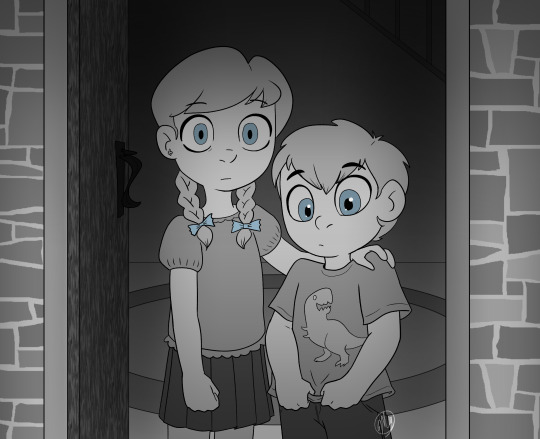


cw below: graphic markings on body of cadaver

#dca!serial killer au#serial killer duo#sk boys#sk sun#sk moon#serial killer sun#serial killer moon#illustrations#for the children#ao3#fnaf sun#fnaf moon#fnaf daycare au#fnaf dca au#fnaf daycare attendant#dca au#ftc chapter 3#tw scars#lacerations
472 notes
·
View notes